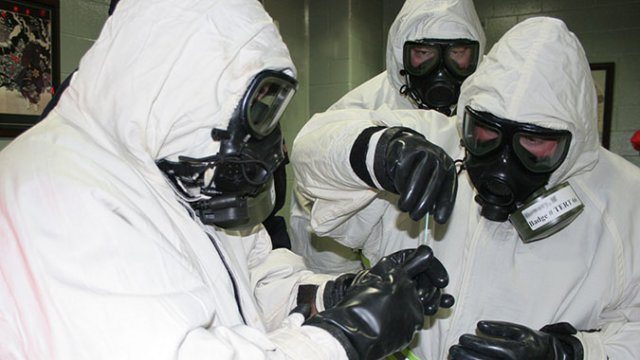An envelope laced with ricin intended for the president of the United States was intercepted in April 2013 by law enforcement officials when protocols established for mail screenings revealed the threat of a biological weapon.
Ricin is a highly toxic, naturally occurring protein found in the seeds of the castor oil plant. There is currently no antidote for the substance, which could be lethal if an average adult inhaled a dose the size of a few grains of salt.
Preventing the transport of materials laced with ricin is a priority for the national defense community, but in the event of an unknown attack, scientists at the U.S. Army Edgewood Chemical Biological Center are researching effective decontamination methods for the deadly substance.
The Centers for Disease Control, known as the CDC, reached out to Jason Edmonds, Ph.D., who serves as the branch chief for Aerosol Sciences at ECBC’s Research and Technology Directorate. They asked him to perform studies to identify methodologies for fully decontaminating ricin from a surface and to determine whether there is residual ricin on a surface after it’s been decontaminated.
“Right now the biggest problem the CDC faces is determining if an exposed surface still has trace amounts of ricin on it,” Edmonds said. “In the case of the U.S. Postal Service, it would be from the point it was put in the mailbox to the point it was identified in the sorting facility.”
Edmonds said the CDC also wants to explore techniques for complete decontamination of an exposed surface area.
“It’s important to remember that when it comes to deadly toxins like ricin, you cannot just clean up 99 percent of the surface, it must be decontaminated 100 percent in order to guarantee that someone will not be affected,” he said.
The CDC approached Edmonds because he is one of the only people to be published on the subject of evaluating technologies for sampling of ricin off of different surfaces.
The paper, which is entitled, “Surface Sampling of a Dry Aerosol Deposited Ricin,” examines swab materials commonly used to sample biological threat agents from surfaces. The paper documents his studies, which demonstrates the need for accurate dissemination techniques to effectively evaluate sampling technologies in an environment mimicking the “real-world” environment where the toxin may be present.
In order to complete the studies, Edmonds and his team will work with the actual substance rather than a simulant.
“Due to the nature of its toxicity, most studies are conducted using a ricin-like protein, but the problem there is that they are not exactly the same as ricin. It doesn’t act like ricin, doesn’t look like ricin, but since the simulant is a biological protein, people try to make that connection,” Edmonds said.
Edmonds and his team will use specialized chambers in buildings approved for handling hazardous material at ECBC, which are designed to safely assess chemical and biological materials, including ricin. The team will produce a methodology for evenly distributing the ricin powder over individual testing materials that represent a variety of surfaces such as glass and steel.
To study decontamination, the team will aerosolize the powder across the test materials, apply a decontamination technique and repeat the same extraction process for the CDC.
According to Edmonds, the CDC is finalizing the preferred decontamination methodology for ECBC to utilize. This project is a collaborative effort across Edmonds’ team in the Aerosol Sciences Branch, the Chemistry Division and BioSciences Division.
“This will be an exclusive partnership between ECBC and the CDC,” Edmonds said. “We’re excited for the opportunity to work with them again and to be one of the first to study ricin in this way. The potential outcome of this study could lead to some incredible solutions to protect our nation from toxin attacks.”











